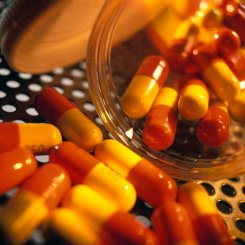 An international team of researchers finds that taking a single daily dose of an approved antiviral drug known as valacyclovir can reduce the transmission of genital herpes to uninfected partners by 50 percent. The results are published in the New England Journal of Medicine. The team of researchers led by Dr. Larry Corey, a member of Fred Hutchinson Cancer Research, conducted a study of nearly 1,500 heterosexual monogamous couples in which one partner had genital herpes and the other did not. Infected partners who received a standard daily oral dose each day of valacyclovir were half as likely to transmit herpes simplex type 2 (HSV-2) than infected partners given a placebo.
An international team of researchers finds that taking a single daily dose of an approved antiviral drug known as valacyclovir can reduce the transmission of genital herpes to uninfected partners by 50 percent. The results are published in the New England Journal of Medicine. The team of researchers led by Dr. Larry Corey, a member of Fred Hutchinson Cancer Research, conducted a study of nearly 1,500 heterosexual monogamous couples in which one partner had genital herpes and the other did not. Infected partners who received a standard daily oral dose each day of valacyclovir were half as likely to transmit herpes simplex type 2 (HSV-2) than infected partners given a placebo. University of Washington collaborators included Dr. Anna Wald and Dr. R. Ashley Morrow.
The strategy potentially could be applied to combat the spread of other sexually transmitted diseases that are caused by viruses. "This is the first demonstration that an antiviral drug can prevent a viral sexually transmitted disease," said Corey. "The study provides the conceptual framework to extend other viral sexually transmitted diseases, such has HIV infection."
Genital herpes is caused by HSV-2 and infects about 50 million Americans over age 20. The virus is transmitted through sexual contact and is often silent, which contributes to the spread of disease. Those who do develop symptoms experience genital ulcers that are often painful. Infected individuals can transmit the virus even when they are not aware that they are infected or when no symptoms are present, and the infection can remain in the body indefinitely. Almost 80 percent of persons with HSV-2 are not diagnosed because accurate blood tests to detect antibodies signifying infection with the virus have only recently been developed and are not widely used.
Antiviral drugs, such as acyclovir and more recently, valacyclovir and famciclovir, have been known to reduce herpes outbreaks for nearly two decades. In the last few years, Wald, Corey and others have shown that such drugs also reduce the frequency and amount of HSV-2 that is shed from the genital area, which is the major source of herpes transmission. This observation provided the rationale for the current study, which sought to determine whether reducing the amount of viral shedding-even in the absence of clinical symptoms-could prevent herpes transmission.
The study, conducted at 96 centers in the United States, Canada, Europe, South America and Australia, used blood tests for HSV-2 antibody to identify monogamous heterosexual couples in which one partner had genital herpes and one did not. The person with herpes in each couple was randomly assigned to either receive a daily dose of valacyclovir or a placebo. The study was conducted in a double-blind fashion, meaning that neither the researchers nor the participants knew which treatment they received.
Susceptible partners were evaluated monthly for a total of eight months for signs and symptoms of HSV-2 infection and for HSV-2 antibody in the blood. Source partners (those with herpes at the outset of the study) were examined monthly for disease recurrence. Both partners were counseled on safer-sex practices and offered condoms at each visit.
At the end of the eight-month study period, genital herpes had occurred in 41 of the sexual partners of those on placebo versus 21 who took valacyclovir, as judged by the antibody-blood test. Couples who used condoms and valacyclovir had the lowest transmission rate.
The findings that antiviral therapy reduces HSV-2 transmission add an important option in the management of patients with genital herpes who are sexually active, said Wald, medical director of the UW Virology Research Clinic.
"We hope the results will encourage more persons to be tested for HSV-2 and more physicians to offer suppressive antiviral therapy for those with HSV-2 infection," she said. Valacyclovir, marketed as Valtrex by GlaxoSmithKline, has recently received approval from the U.S. Food and Drug Administration for use in preventing genital herpes in couples in which one partner has genital herpes.
The effectiveness of antivirals at reducing genital herpes transmission could also help to stem the AIDS epidemic, which affects 42 million people around the world. Scientists have become worried about the increasing genital herpes epidemic worldwide because recent studies indicate HSV-2 may help to spread HIV, which causes AIDS. Persons with genital herpes are two times more likely to acquire the HIV-1 virus. Dr. Connie Celum, UW professor of medicine, Wald and Corey have received funding from the Bill and Melinda Gates Foundation to evaluate whether acyclovir, the parent compound of valacyclovir, can reduce the transmission of HIV by suppressing the HSV-2 virus and reducing its effects on HIV-1 in genital fluids.
"If effective, therapy for HSV-2 could offer another way for decreasing the spread of HIV, which could be helpful until a vaccine for HIV is developed," Corey said. "Also, this approach highlights the importance of working toward developing a vaccine for HSV-2."